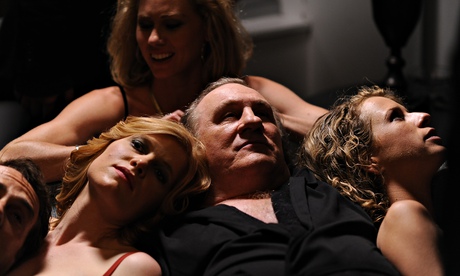
Abel Ferrara's crazy, sulphurous, toweringly unpleasant Welcome to New York is like an "issue" movie about sexual assault being beamed to cinema screens live from the seventh circle of hell. There are no blurred lines here, no ambiguities, no water-cooler talking points about gradations of consent. This film's protagonist is simply guilty; he is a rapist, grown obese on his own wealth and entitlement. Steve McQueen made a movie about sex addiction called Shame. This one could be called Pride. Or maybe Self-Pity. Only Ferrara, that raucous director, could have made it – being so entirely unencumbered by the kind of middlebrow good taste that might have led another kind of film-maker into revisionism and equivocation. Ferrara was the director responsible for the under-rated pulp classics The Addiction and The Funeral, all about the endless DNA-replication of evil. We get a taste here of the same eternal despair. There are some clunky moments in the dialogue and direction, and maybe Ferrara doesn't quite finesse the switches between French and English, but Welcome to New York has the brutal courage of its convictions. It sets out to show a monster, and it succeeds.
The film takes as its starting point the case of Dominique Strauss-Kahn, the French leftist economist and politician accused in 2011 of sexually assaulting a maid in his New York hotel room, but finally acquitted when his defence team succeeded in undermining her evidence and credibility; he later admitted to "inappropriate" behaviour and settled a civil suit out of court. A statement, flashed up on screen before the film begins, announces the film's fictional credentials, though conceding it is inspired by Strauss-Kahn. But, with some insolence, Ferrara uses TV press conference footage of the actual Strauss-Kahn case and slots it into the narrative.
Gérard Depardieu plays Devereaux, the president of a French financial institution; he is a smug and self-satisfied player on the Parisian social scene, a near-exhausted volcano of political ambition whose bleary liberalism and affected sexual frankness amount to boorish arrogance. He is addicted to prostitutes and to using them for coercion and leverage in official dealings. Devereaux travels to New York on business, enjoys a gruesome 12 hours of champagne, drugs and escorts in his suite and winds up by attempting to grab and masturbate over the maid, played by Pamela Afesi, who has come to clean up his room.
He is guilty: no question about it, his guilt, reeking to high heavens, infuriates his wife Simone, played by Jacqueline Bisset, who is burdened with her loyalty to this ageing priapic baby and by the certainty that the case, however it turns out, has definitively ruined both their lives.
There are two unforgettably horrible parts to this film: the first is the hideous, mirthless laughter of the middle-aged men and the prostitutes taking part in the grisly demi-orgy, people laughing at things that aren't funny; it is the deathly sound of porn-star bad acting, partly, but also the chillingly plausible sound of men who do a lot of coke looking forward to what they imagine to be consequence-free sex.
Then there is Devereaux's stay in prison, which reaches its nadir when he is forced to strip. Depardieu's nakedness is truly startling. His stomach's emergence is like a flesh mudslide. To paraphrase Hanif Kureishi, it spills out over his penis like a suitcase falling off the top of a wardrobe. And there is a horrendous moment when he is told to put his clothes back on: rather than endure the drawn-out indignity of getting his tent-like underpants back in place, Devereaux quickly pulls his trousers on and absurdly stuffs his pants quickly in his pocket – to the guards' savage incredulity and contempt.
This is a brutal, occasionally inelegant film, but it pulls no punches and shines a stark, pitiless light on its subject. Some of this man's conquests have been consenting in the past, which only emboldens him to believe that he is entitled to take what he wants in every case. A dark night of the soul while the case is in progress is soon replaced by his sentimental belief in himself as the injured party, unrepentant to the very end.
What Depardieu himself makes of his character and his own (excellent) performance is something of a mystery. There is a weird pre-emptive, "interview" scene at the beginning in which he explains to a gallery of fictional reporters that he was attracted to the role precisely because the man is so unpleasant, and unpleasant he certainly is: as unpleasant as Ferrara's King of New York, his Bad Lieutenant, and his vampires in The Addiction. He is another creature of the night, strip-mined of all human feeling.

